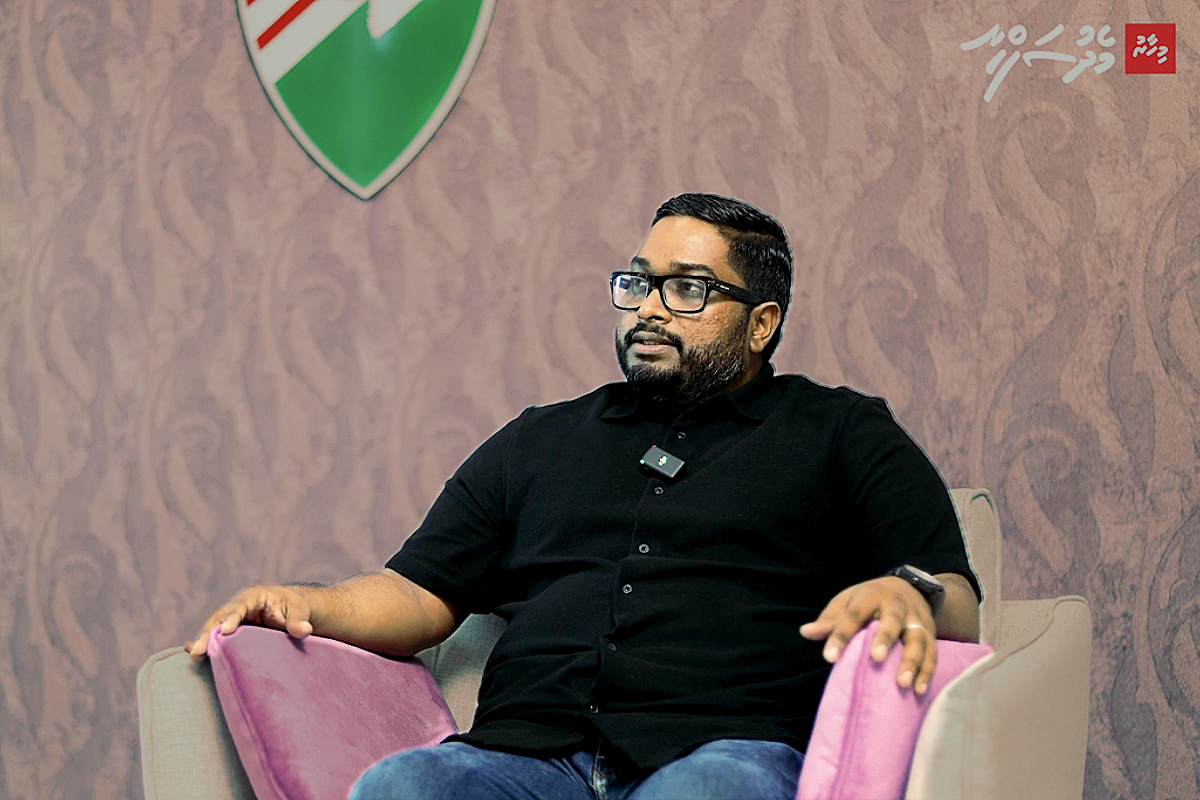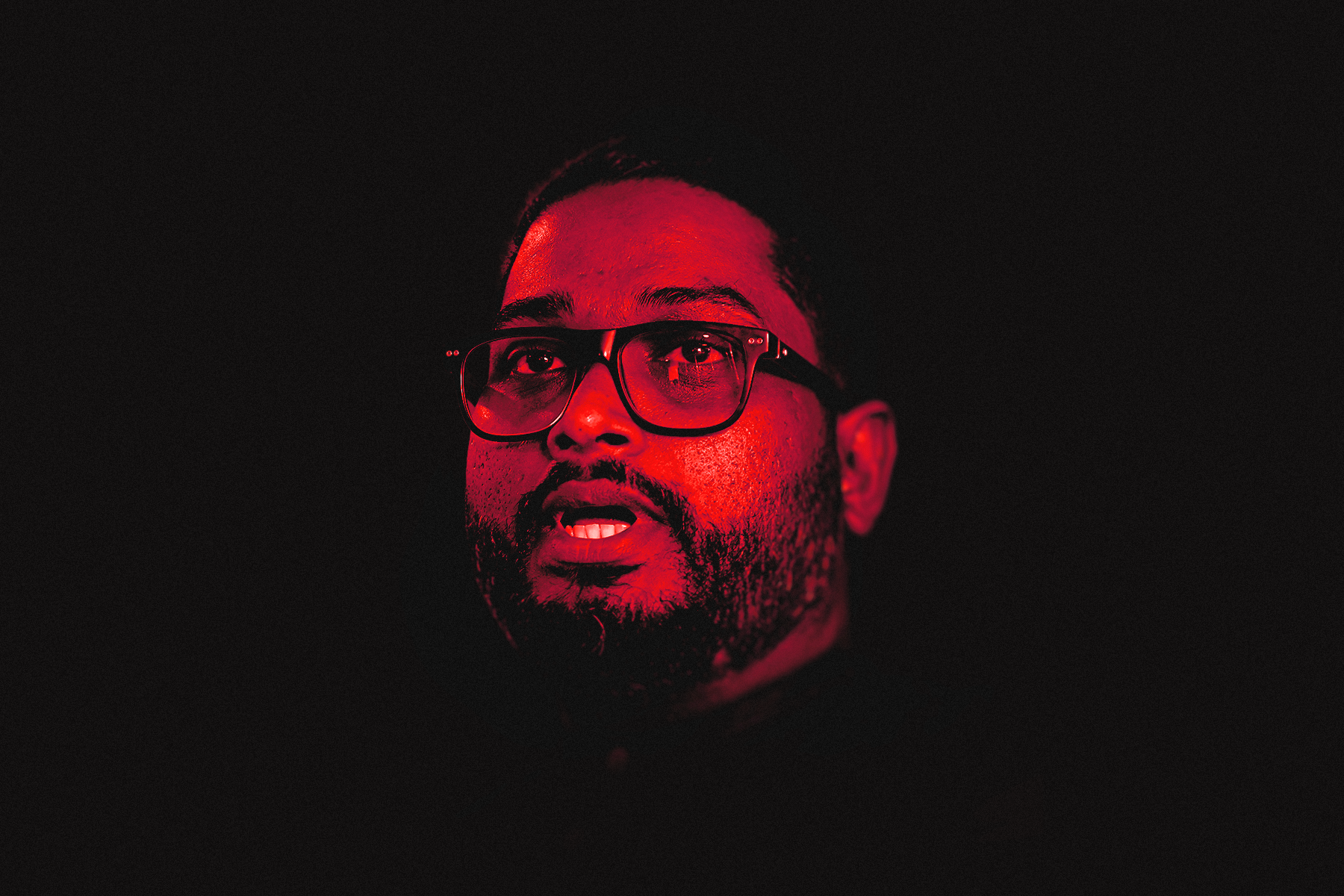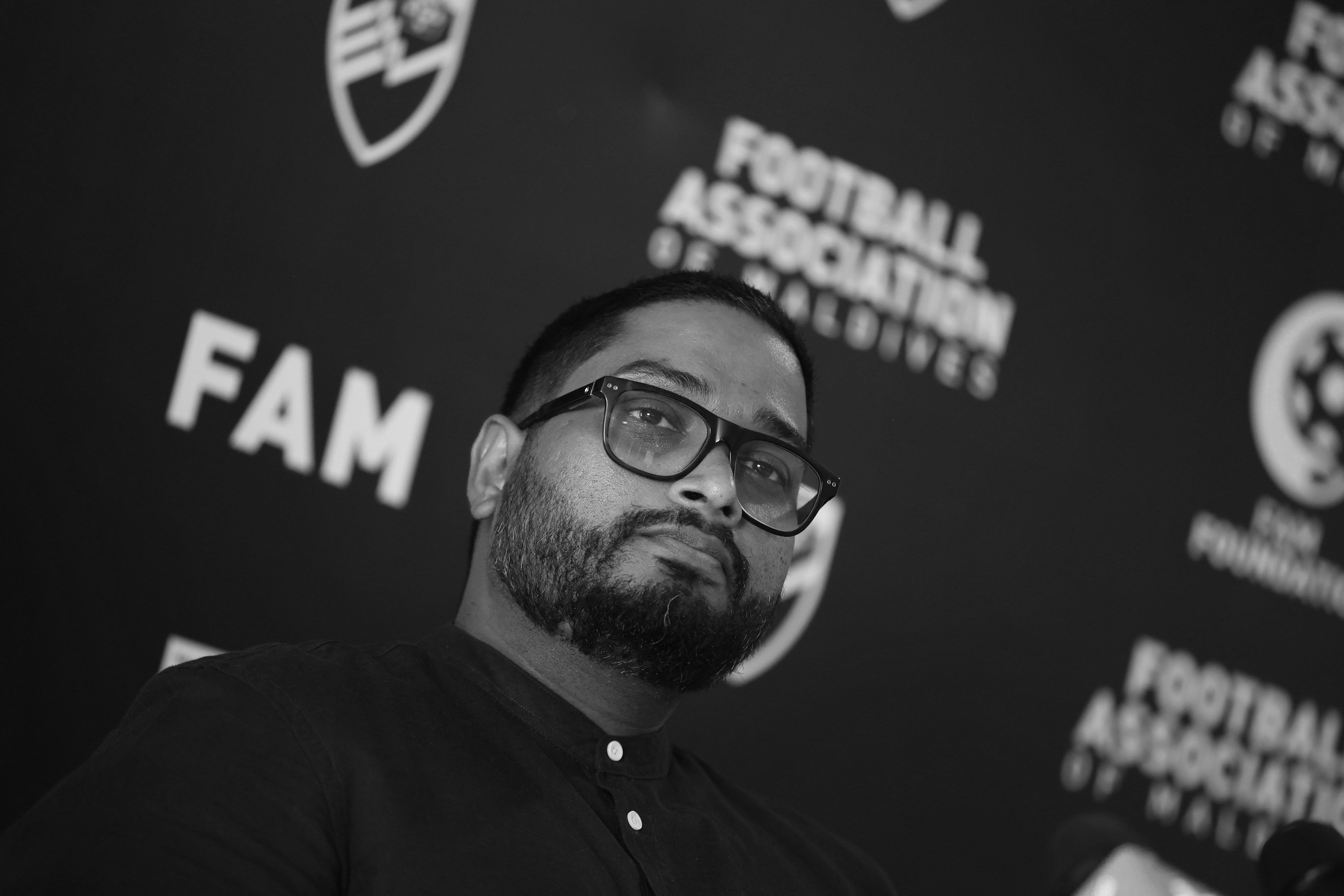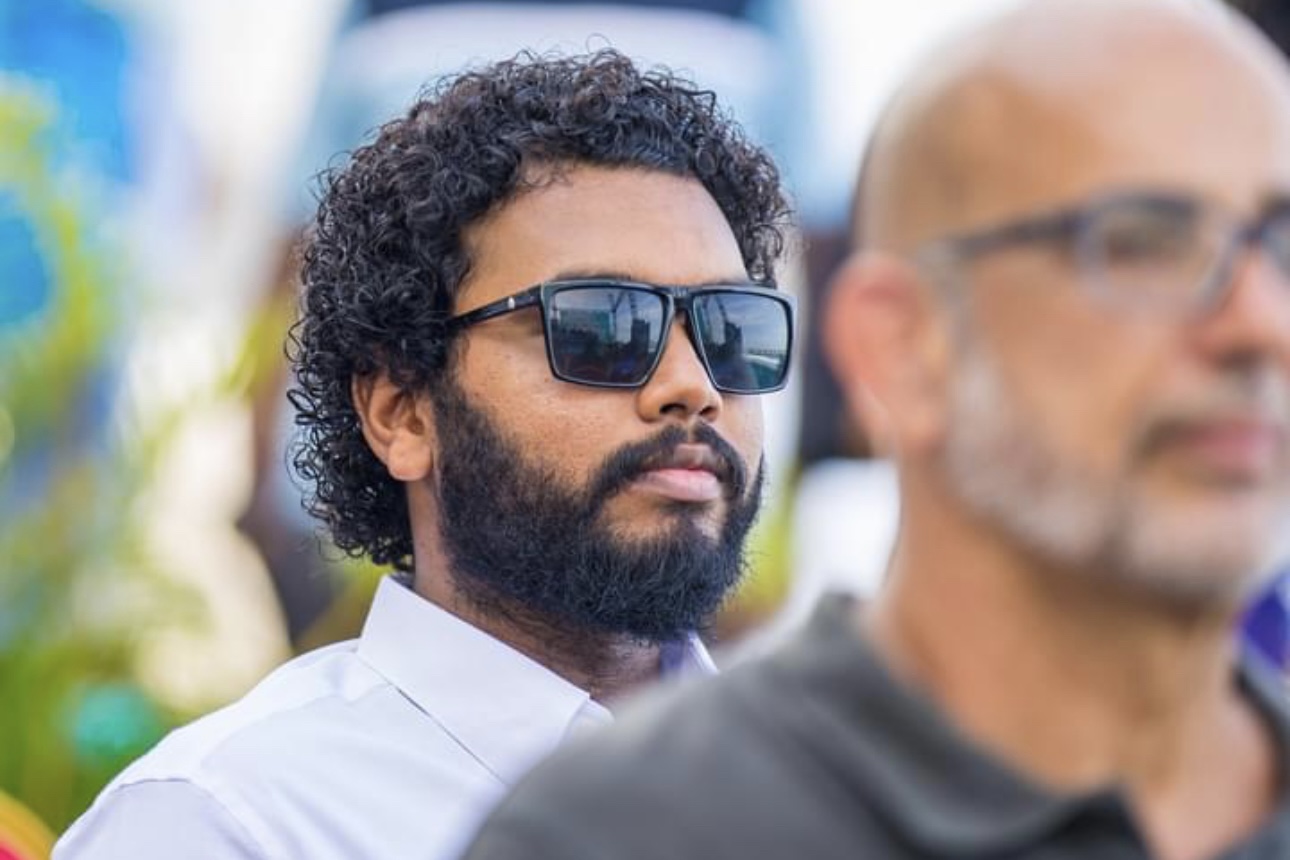“The deeper we dig, the more we find.” This was a statement by FAM Normalization Committee member Ismail Simon, during an appearance on a recent episode of Ithuru Vaahaka podcast by Maldives Independent.
According to Simon, “what the public knows is just very little of the extent of the problem.” He added that the FIFA delegates who work with the committee described the situation as the “worst they had ever seen” inside a football association.
In part one of the series, we examined FAM’s predicament from Bassam’s perspective, focusing on a candid, 40-minute interview just months before the charges were pressed. In part two, we dug into the financial and legal cost of pursuing the “biggest projects in FAM history”. This is a continuation of part two.
In the interview with Mihaaru, Bassam vehemently denied the accusations, which at the time weren’t formal charges, but police investigations and media reports. He said, “Ever since I was elected, I kept my promise of keeping this (FAM) as a clean place”, reiterating that “nothing has ever been wrong in our audits”.
With regards to the practice of money exchange, he denied accusations that FAM was misusing FIFA funds. Bassam had said, “The EXCO selected certain companies for the use of dollar exchange. The money received from FIFA, AFC and other benefactors, were being exchanged to Maldivian Rufiyaa under the said agreement with these companies. That was it.”
He even went through the extra effort of getting the foreign-exchange license although “as a practice, we are not obligated to”. Bassam claims to have discussed these matters with the Governor of Maldives Monitory Authority, who apparently insisted him on carrying on.
He acknowledged delays in FIFA disbursements and the economic impact of the pandemic, but denied the allegations of money laundering: “I ensure you, with one hundred percent certainty, no amount of money would have gone into our [FAM senior members’] accounts,”
He wrapped up the Interview by claiming “I think the accusations, those fingers cannot be pointed at us. I am saying this with earnestness: there is not a single illegal transaction from inside this place (FA)”. He claimed to give full co-operation from the side of FA, and hoped for the police to do a thorough investigation, so that it would be proven he was, in fact, innocent.
Bassam Spent Most of FAM’s $12 Million on Properties and Personal Businesses: PG Office
That was Bassam’s final appearance on media as FAM president.
Bassam’s account of things stood increasingly at odds with what the police uncovered in the next few weeks, and what the Prosecutor General’s Office charged him with.
Just two months after Bassam’s interview with Mihaaru, the Prosecutor General charged him with a) Theft by failing to deliver funds entrusted, and b) Money Laundering. Depending on the verdict, Bassam could face five to fifteen years in prison.
The police investigation had found that around ten thousand USD were in fact transferred to Bassam’s personal bank account. USD 1,910 was deposited to another person’s account and later transferred to the account of the Glacier Investment company owned by Bassam and his wife. The two penthouses in Amin Avenue, which Bassam allegedly purchased with the laundered money, were later retrieved by the state.
The PGO stated in late 2024 that it is “closely examining additional evidence, and Mr. Bassam Adeel Jaleel, along with other employees of FAM, may face further charges as the inquiry progresses.
Of the equivalent of nearly MVR 191.2 million disbursed by FIFA in aid to FAM from January 2018 until October 2023, much was unaccounted for.
This was, after all, too grand a theft for one man to pull. Just last month, the Maldives Police Service shared that it is probing into the audits of the first division clubs during Bassam’s tenure. The police shared their newfound suspicion that large amounts of the money funded by FIFA could have been transferred to the personal accounts and businesses of the owners of certain member clubs of the FA.
By the time FAM went under normalization last August, the cumulative debt exceeded MVR 150 million, according to Ahmed Zuhoor, the NC chairman at the time. What the Normalization Committee’s briefings revealed was just how complicated the paper trails were; that the committee cannot map the full extent of the fraud.
Regarding FAM’s disputes with contractors and SOEs, a series of court judgements were put out since the FA went under normalization.
The first of these verdicts were returned in September 2024, when the Civil Court ordered FAM to pay MVR 1.5 million to the State Trading Organization – concerning the sponsorship refund of a cancelled football tournament meant to be held in the southern atolls.
In October 2024, Island Aviation informed the FAM Normalization Committee that the association owed MVR 7.4 million for tickets purchased in 2016 and 2017. The airline said they had issued invoices and even held internal meetings with FAM officials at the time, but the payments never came.
A separate financial audit into the stalled football school project, released in May 2025, revealed that more than MVR 20 million had been paid to private parties without any supporting documentation.
FAM was also found liable for USD 3.2 million in damages to South Korean contractor T Kuing Construction. The dispute originated from an agreement to build a number of small football grounds and renovate facilities under FIFA Forward funds. The contractor claimed that after completing parts of the project, they received no further communication from FAM.
Another controversial settlement was reached with Apollo Holdings in 2022. Facing a MVR 13 million debt, FAM signed over 5,000 square feet of land in Hulhumalé that had been allocated for the national football academy.
On the Ithuruvaahaka podcast, when asked about the lack of monitoring and government intervention, Simon said: “It is something frowned upon by the international bodies (FIFA and AFC), because there are some governments who do surveil their FAs…. (not to supervise but) in order to assert undue influence.” This raises the question – at what point does a government draw the line on non-intervention into an FA? To what extent were the Maldivian government aware of the crimes committed behind closed doors of FAM?
“The problem needs to be addressed. The FA receives fund via FIFA, international donors and through partnerships… But whether it is the FA, or the clubs, this misuse of funds outside the mandate needs to stop, if we expect things to get better” says Simon. “Reporting mechanisms need to be looked at, I think. Also reporting standards need to become better”.
With regards to damage control, Simon said that the committee have tried to appeal in court wherever possible and negotiate settlements otherwise. But the NC would not interfere in cases where a verdict has already been reached.
As the Normalization Committee’s term expires at the end of this July, and as the FAM Congress this Saturday is set to elect a new president and a new exco, what Bassam called a ‘clean administration’ leaves a legacy of more than MVR 150 million in debt and a pile of lawsuits. Bassam’s nine-month suspension by FIFA had expired in March, but his name will not be on the ballot.
But the real cost of all this, is the future of Maldivian football; it has been mortgaged without consent. Should Maldivians still be surprised when FAM gets labelled by FIFA experts as the ‘worst-run football association in the world’?
Bassam insisted he ran a clean house, with clean audits and zero scandals. The abrupt denial of accusations in his very last public appearance had shown that he would rather fight a PR war than let the FAM’s image be tainted. However, if he truly wanted that reputation – if he truly was the revolutionary leader he claimed to be – the last thing he would do is funnel football money into phantom projects, or worse, into his own pocket.


 Ali Thameem
Ali Thameem









